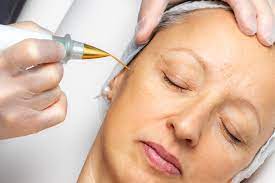The TikTok-famous treatment is said to tighten and firm skin by stimulating repair… but there’s a risk for permanent damage.
For every game-changing beauty hack that goes viral on TikTok, there’s another that makes us wonder if the DIY movement has gone a bridge too far. And at-home plasma pen treatments fall squarely in the latter camp.
Even if you’re not familiar with the tool itself, if you regularly engage with skin-care content on TikTok, it’s very possible you’ve seen the results of one: Plasma pens leave pinhead-size markings on the skin. Those who receive full-face treatments are left looking something like pointillist paintings. (You’ll see what we mean if you search #fibroblastplasma or #plasmapen on TikTok.)
The devices look not so different from a mechanical toothbrush — but instead of a brush head, plasma pens have a needle-like tip. However, the tip never touches the skin — it’s merely the means through which an arc of plasma passes.
What Is Plasma?
But what is plasma? Sometimes called the fourth state of matter, plasma forms when a gas is super-heated. (And it’s not to be confused with the component of your blood of the same name, which you might be familiar with if you’ve read up on PRP — or platelet-rich plasma — treatments.) The arc of plasma generated by a plasma pen singes the skin and in turn, creates the aforementioned marking. The process is then repeated over the entirety of the desired treatment area.
How Do Plasma Pens Work?
The process is said to make skin firmer and tighter by inducing trauma that triggers skin cells called fibroblasts to produce more collagen (hence why these devices are sometimes called fibroblast plasma pens). This way of thinking isn’t new: It’s well-established that creating micro-wounds on the skin prompts cells to go into repair-mode. Cosmetic chemist Ginger King notes that that same logic can be applied to microneedling devices.
However, unlike microneedling, which creates teeny-tiny punctures, using a plasma pen chars the skin, says Lara Devgan, M.D., a board-certified plastic surgeon in New York City. “[Plasma pens] basically cook a little dot of tissue,” says Dr. Devgan, who adds that doing so does provide a “transient appearance” of tighter skin.
What Are the Risks of Using a Plasma Pen?
That said, the long-term results may be less desirable. Dr. Devgan puts it this way: “When you apply heat to tissue, you can tighten the tissue, but you’re denaturing its proteins. Let’s say you have a raw steak and you cook it. You’re denaturing the proteins of the steak, so you’re fundamentally changing it. The cooked steak doesn’t look anything like the raw steak and it doesn’t move the same way. It has a leathery quality; it doesn’t have the same suppleness,” she says. “So if that’s your face, you want the smoothness, suppleness and movement of ‘raw’ or ‘uncooked’ tissue. And so that’s the reason why applying heat or electrical or burning energy to the skin is not a desirable way to achieve tightening.”
The treatment also poses a risk of creating scars and pitting, says Dr. Devgan. And people of color in particular are susceptible to treated areas becoming hyperpigmented. According to Dr. Devgan, these side effects “can happen after [just] one session.”
And because at-home plasma pens area not regulated by the Food and Drug Administration, there would be little recourse for sufferers. “The FDA is not aware of any legally marketed device of this kind,” said an FDA spokesperson in a statement obtained by Allure.
Without FDA oversight, “you have no real assurances that the product meets the advertised specifications or is usable in a safe way,” says Alex R. Thiersch, an attorney representing the aesthetics industry and the founder of the American Med Spa Association. “You also know little about the manufacturing process, efficacy, or have any real background on the maker of the product.”
The fact that one of the most popular plasma pens on TikTok — Plamere’s Premium Pen — claims FDA-registration adds to the murkiness. (Allure reached out to the company, but did not receive a response.) Bottom line: The risks associated with plasma pens aren’t worth the (short-term) reward.
Read & Write : write for us


